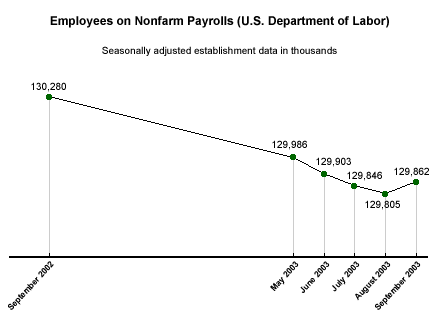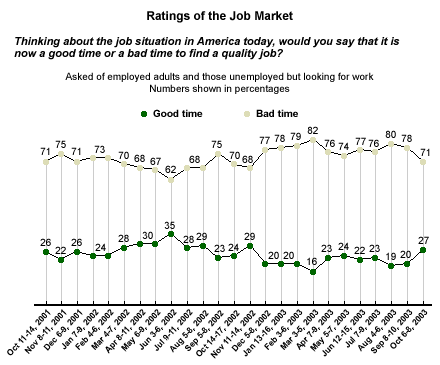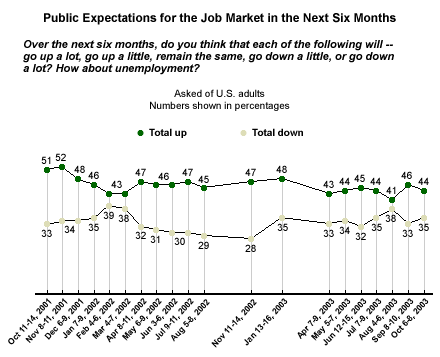The U.S. Department of Labor recently reported that the number of unemployed persons was nearly unchanged in September, at 9 million. Currently there are fewer employed Americans than there were a year ago. Still, the equity markets and media emphasized the news that the economy added more than 50,000 jobs last month -- the first increase since February -- pointing out that it further confirmed that the economy is expanding at a healthy rate.
New Gallup Poll economic data collected Oct. 6-8* suggest that this positive news about the economy and the employment picture has helped reduce public pessimism about the job outlook. More Americans who have jobs or are looking for jobs tell Gallup that now is a good time to find a quality job.
Of course, this is good news for the economy and political incumbents pondering re-election next year. But the key question remains: Is this the beginning of a trend or another false start for the job market?
No New Job Creation
Total nonfarm payroll employment was 129.9 million in September, according to Labor Department figures. Manufacturing employment continued to decline, but at a slower pace. Professional and business services added 66,000 jobs, but half this increase was in temporary help services.

Less Job Seeker Pessimism
According to the Gallup Poll, the percentage of employed adults and adults looking for work who say now is a good time to find a quality job increased from 20% in September to 27% in October. At the same time, the percentage saying now is a bad time to find a job decreased from 78% to 71%. Thus, the differential between these two numbers (the percentage saying now is a good time to find a job and the percentage saying now is a bad time to find a job) is now at 44 percentage points -- the smallest gap since November 2002.

Less Pessimism Among the Public
The percentage of Americans telling Gallup they think unemployment will increase over the next six months declined two points from 46% in September to 44% in October, and the percentage expecting unemployment to decrease went from 33% to 35%. The differential between the two percentages (four points) is back to where it was in July.

Recovery Doesn't Mean Job Growth
Last week, the Business Council reported on survey findings showing that the CEOs of the largest multinational corporations are "modestly optimistic" that the economy will continue to improve next year. Currently, economists are generally expecting continued strong economic growth. However, nearly two-thirds of these CEOs (63%) say they expect employment in their own companies to be stable next year, while only 14% say they are planning to increase their hiring.
That's not good news for today's job seekers. It suggests that their numbers are likely to increase in the next year, and that the percentage of the unemployed who have been looking for work for more than 27 weeks (currently 23.2%) may continue to increase in the months ahead. It also implies that the September improvement in job market expectations is not likely to turn into a trend.
The Business Council report is also bad news for political incumbents. Right now, only 42% of the public approves of the way the president is handling the economy and 55% disapprove -- the lowest point since Gallup began measuring this aspect of the president's job approval in February 2001. Given the current public angst about the way politicians are handling the economy (as reflected, for example, by the recall results in California), incumbents have good reason to share these concerns themselves.
In this regard, policy-makers may want to take special note of the recent Wells Fargo/Gallup Small Business Index survey, which shows that 23% of small-business owners plan to increase their hiring over the next 12 months. Small businesses -- not multinational corporations -- are likely to be the source of increased U.S. jobs as the economy improves. The small-business sector of the economy deserves special incentives to make its job creation expectations a reality as soon as possible.
*Results are based on telephone interviews with 1,017 national adults, aged 18 and older, conducted Oct. 6-8, 2003. For results based on these total samples, one can say with 95% confidence that the margin of sampling error is ±3 percentage points.

